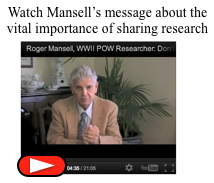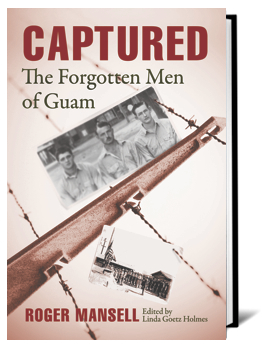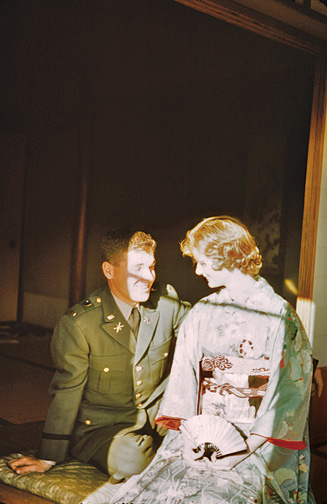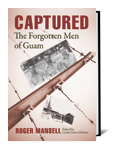"His was a
legacy to everybody wanting to know about the Pacific war, not
just researchers, but also people who want to know what happened
to their loved ones."
Linda Goetz Holmes
Roger Mansell of Palo Alto, California passed away peacefully
at home surrounded by family on October 25, 2010.
FOUNDER OF CENTER FOR RESEARCH ALLIED POWS UNDER THE JAPANESE
Roger Mansell was born in 1935 in Brooklyn, New York. After
graduating from Mepham Highschool in Wantaugh, NY, he attended
Brown University. Commissioned in the U.S. Army Artillery he
was stationed in Korea then at Fort Bliss,Texas. Having completed
his military sevice, in 1962, he moved to California and a successful
business career. It was to be the deep impression made upon him
by an employee who, as a child, had been a prisoner under the
Japanese during WWII, that set him on a course to discover more.
A family friend, Maj. General Ralph Smith, who died at 104 in
1998, the oldest surviving general of WWII, encouraged him to
join the local American Legion and partipate in their activities
such a lunch group that met regularly to discuss WWII history.
When he met a veteran who had been taken prisoner by the Japanese
on Guam, Mansell realized that many of the ex POWs, now elderly,
had never told anyone about their experiences in what was a crucially
important part of the history of the war in the Pacific.
After he retired from a career in business in the 1990s, he began
researching the allied POWs of the Japanese, a gruesome story
that had been largely buried in inaccessible archives.
Over more than twenty
years, he made multiple and extended visits to the National Archives Modern Military
Records in College Park, MD, and to the Hoover Institution Library
and Archives, as well as military historical centers, scanning and photographing
thousands of documents that had never before been been centralized
or complied.
He
perfected a technique of mounting a camera on a tripod to film
documents, which he shared with would-be researchers, POWs and
their descendants at ADBC and Far East POW conventions until
shortly before his death.
Since the beginning
of Mansell’s project, his chief goal was to compile a database
of more than 100,000 records to document what happened to every
Allied soldier who was captured by Japanese forces during the
war. Approximately 90 percent completed at the time of his death,
this vast database contains information on when soldiers were
captured, where they were interned, and whether they died or
were repatriated at the end of the war, as well as the conditions
of their captivity.
He founded the Center
for Research Allied POWs Under the Japanese which posted
the research on its website, www.mansell.com.
That website has been turned over his colleague, Wes Injerd.
He turned his retirement into a full-time job not only undertaking
research and elaborating the website, but  assisting
the hundreds of people who came to his website looking for information
about what had happened to friends, fathers, grandfathers, and
others.
assisting
the hundreds of people who came to his website looking for information
about what had happened to friends, fathers, grandfathers, and
others.
As one result of his
research, Mansell has helped several families locate the remains
of soldiers who were missing in action during the war; he has
also frequently been consulted by researchers around the world
seeking information about individual soldiers or the camps in
which they were interned.
At the annual conventions
of the American Defenders of Bataan and Corregidor (ADBC), he
gave talks about aspects of his research, and he always brought
his laptop computer to be able to assist the many people who
had questions about the rosters and the camps.
Historian Linda Goetz Holmes, author of Unjust
Enrichment: American POWs Under the Rising Sun, recalls
long lines of people waiting to consult him. "Often he would
be able to tell an ex-POW that his buddy from prison camp survived
the war, and is alive and well in San Diego (or someplace). The
man would frequently thank Roger with tears in his eyes. At recent
conventions. Roger gave talks on archival research and distributed
CDs of data— all compiled
at his own expense. Roger's mantra was, 'Share your research.'"
As Goetz Holmes
emphasizes, "Roger showed people how to research."
He also spoke at conferences abroad, including the U.K. where,
in 2006, he addressed the first International Researching FEPOW
History Conference held at the National Memorial Arboretum, Alrewas.
In in China in 2008, he was named a fellow at the University
of Shenyang Research center on WWII POWs, at a conference on
the Mukden
survivors.
Only a fortnight before
his death he sent a video recorded talk which was greeted with
sustained applause at the 2010 FEPOW History Conference.
He also continually stressed the importance of preserving rare
memoirs, books, letters, documents, photographs and more.
Update: "POW
Families Connect: Grandson's Persistent Research Pays Off"
by Katrina Palanca, Pacific Daily News, July 18, 2012
Mentions Roger Mansell
DONATION OF ARCHIVE TO THE HOOVER INSTITUTION
In September 2010,
the Hoover Institution
Library and Archives received his large donation of World
War II-era research materials. Consisting of more than fifteen
linear feet of documents, some fifteen hours of video recordings,
and approximately four hundred published titles, as the Hoover
Institution's announcement notes, "the Roger Mansell Collection
will be a valuable resource for those interested in studying
the roles of prisoners of war during that conflict."
 CAPTURED:
THE FORGOTTEN MEN OF GUAM
CAPTURED:
THE FORGOTTEN MEN OF GUAM
In addition to compiling the rosters, Roger Mansell wrote a book,
Captured:
The Forgotten Men of Guam.
Based on over a decade of original and extensive research, including
many interviews with survivors, the mansucript, completed before
his death, was edited by noted POW historian Linda Goetz Holmes
and was published by Naval Institute Press in November 2012.
Captured tells the story of what happened to the men,
both military and civilian (including Pan Am Clipper crews),
captured by the Japanese in the wake of the attack on Pearl Harbor
in 1941.
Visit the book's webpage here.
MORE ABOUT ROGER MANSELL
The sixth of eight children, he was born October 8, 1935 in Brooklyn
New York to Francis and Elizabeth Mansell.
EDUCATION
After graduating from Mepham Highschool in Wantaugh, NY in 1953,
he attended Brown University, where he met his wife, Carolyn
Mayo Mansell, whom he married in 1959 in the Brown University
chapel.
>>Read the on-line article about Roger Mansell and his
work in the Brown University Alumni Magazine, "Hooked on History"
by Sheila Dillon
MILITARY CAREER
 After
Officer Candidate School, he received his commission in the U.S.
Army Artillery later that same year and was stationed in Korea
on the DMZ until 1960. During this time he learned some Korean
and traveled to Tokyo for his honeymoon. From 1960-1962, he was
stationed at Fort Bliss in El Paso, Texas, where his daughter
Catherine was born. While at Fort Bliss he worked on the Hawk
Missile system (one of the most highly advanced systems at that
time), and frequently at White Sands Missile Range.
After
Officer Candidate School, he received his commission in the U.S.
Army Artillery later that same year and was stationed in Korea
on the DMZ until 1960. During this time he learned some Korean
and traveled to Tokyo for his honeymoon. From 1960-1962, he was
stationed at Fort Bliss in El Paso, Texas, where his daughter
Catherine was born. While at Fort Bliss he worked on the Hawk
Missile system (one of the most highly advanced systems at that
time), and frequently at White Sands Missile Range.
MOVE TO CALIFORNIA
AND BUSINESS CAREER
In 1962, having
fulfilled his commitment to the U.S. Army, he moved with his
family to the San Francisco Bay Area. His father-in-law, Dr Frank
R. Mayo, was then a leading research chemist at Stanford Research
Institute.
Roger Mansell began
his career in business in sales with Addressograph-Multigraph
in San Francisco.
His daughter Alice was born in Palo Alto in 1963.
In the 1960s and 70s he learned to fly small planes and took
the family on several cross-country flights. He taught himself
to play guitar and later he became an avid skier.
During these years he established several of his own businesses,
including Mansell Advertsting, Mansell Graphics, and Mansell
Publishing.
In the 1990s, he relocated his main office to Los Altos.
MEXICO AND TAMEME
Ever since his daughter Catherine's marriage to Agustín
Carstens, a Mexican citizen, in 1986, the Mansell family
has had a close connection to Mexico. In 1988, Roger and his
wife Carolyn purchased a house in Los Cabos, at the end of Mexico's
Baja California California peninsula, where for over two decades,
they spent extended periods of time and made many friends.
 In
the late 90s, together with his daughter Catherine
Mansell Carstens, who writes and translates as C.M.
Mayo, he founded Tameme,
a nonprofit foundation dedicated to publishing new writing in
English and Spanish from Canada, the U.S. and Mexico. The literary
journal Tameme and subsequent chapbook series featured
works by dozens of leading literary figures, among them, Margaret
Atwood, Cola Franzen, P.K. Page, Douglas Glover, Colette Inez,
Edwidge Danticat, Alberto Blanco, and Juan Villoro. Board members
of Tameme included his Mepham Highschool classmates, author Tom
DeLong and poet Harry J. Smith, editor and publisher of The Smith.
In
the late 90s, together with his daughter Catherine
Mansell Carstens, who writes and translates as C.M.
Mayo, he founded Tameme,
a nonprofit foundation dedicated to publishing new writing in
English and Spanish from Canada, the U.S. and Mexico. The literary
journal Tameme and subsequent chapbook series featured
works by dozens of leading literary figures, among them, Margaret
Atwood, Cola Franzen, P.K. Page, Douglas Glover, Colette Inez,
Edwidge Danticat, Alberto Blanco, and Juan Villoro. Board members
of Tameme included his Mepham Highschool classmates, author Tom
DeLong and poet Harry J. Smith, editor and publisher of The Smith.
During much of the time Roger Mansell was researching the POWs,
Catherine (as C.M. Mayo) was researching Mexico's Second Empire
/ French Intervention, also in many archives in Washington DC,
for her novel The
Last Prince of the Mexican Empire, and so they were able
to share many dinners and conversations in Washington DC.
Nuevo:
"El
legado documental de Roger Mansell" por Yolia Tortolero,
Diario de Historias, octubre 2013. (descargar
DF)
CHARACTER
Until the end of his life, he enjoyed playing the piano, and
was partial to WWII songs and Broadway tunes. A great raconteur,
he loved being around people, and reveled in his annual St. Patrick's
Day parties.
SURVIVING FAMILY
Roger Mansell is survived by his wife of 51 years, Carolyn Mansell;
daughter Catherine
Mansell Carstens and son-in-law Agustin
Carstens, and daughter Alice Jean Mansell.
Carolyn Mansell is the
founder and president of Mansell & Co. Residential Real Estate
in Los Altos, CA. Alice Mansell is a lawyer and works in real
estate with Mansell & Co. Catherine Mansell Carstens is a
writer and translator and has published several books as C.M.
Mayo. Agustín Carstens is the Governor of Banco de México.
His surviving siblings are Frank Mansell, Mary Redmond, Joan
Eckhardt, and Margaret Spetnagel.
MEMORIALS
A Memorial Mass was held on Thursday, October 28 at 8 pm at the
Iglesia Santa Catarina in Coyoacán, Mexico City, and a
celebration of his research about the allied POWs of the Japanese
during WWII and the donation of his extensive archive to the
Hoover Institution of Stanford University will be scheduled soon.
 For more information and also
for more about his forthcoming book, Captured: The Forgotten
Men of Guam, please click on the cover.
For more information and also
for more about his forthcoming book, Captured: The Forgotten
Men of Guam, please click on the cover.
For more about his
research, please visit the website of the Center for Research
on the Allied POWs of the Japanese at www.mansell.com



 After
Officer Candidate School, he received his commission in the U.S.
Army Artillery later that same year and was stationed in Korea
on the DMZ until 1960. During this time he learned some Korean
and traveled to Tokyo for his honeymoon. From 1960-1962, he was
stationed at Fort Bliss in El Paso, Texas, where his daughter
Catherine was born. While at Fort Bliss he worked on the Hawk
Missile system (one of the most highly advanced systems at that
time), and frequently at White Sands Missile Range.
After
Officer Candidate School, he received his commission in the U.S.
Army Artillery later that same year and was stationed in Korea
on the DMZ until 1960. During this time he learned some Korean
and traveled to Tokyo for his honeymoon. From 1960-1962, he was
stationed at Fort Bliss in El Paso, Texas, where his daughter
Catherine was born. While at Fort Bliss he worked on the Hawk
Missile system (one of the most highly advanced systems at that
time), and frequently at White Sands Missile Range. In
the late 90s, together with his daughter
In
the late 90s, together with his daughter 
